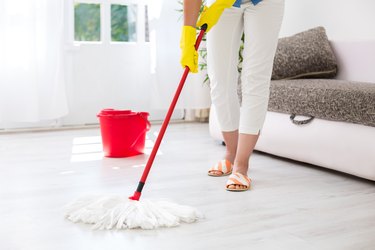Enzymatic cleaners use nonpathogenic good bacteria to break down different types of soils and other messes. The good bacteria produce enzymes that are designed to break down molecules into smaller pieces, which then becomes food for the bacteria, and are then converted to water and carbon dioxide. One enzyme cleaner doesn't work for all cleaning jobs. There are different enzyme cleaners you should use, depending which room of the house you're targeting.

Video of the Day
Enzyme Cleaner for Bathroom and Kitchen
Some people feel bleach is too toxic to use when cleaning their home. Enzyme cleaners are the alternative. The proteins built up on countertops, sinks, tubs and toilets that lead to stains can be resolved with an enzyme cleaner. Bathroom odors can also be knocked out with this type of cleaner.
Video of the Day
Enzyme Cleaner for Laundry
Some laundry detergents don't cut it when it comes to getting oily and fatty stains out of clothing. However, enzyme cleaners can usually do the trick. You can treat a stained shirt by soaking it for a while in an enzyme pre-treatment and then thoroughly wash it with a detergent of your choice, preferably an eco-friendly detergent. If the stain you're dealing with is either coffee, grease or chocolate, it should come right out.
Conquer Pet Stains
If you're a pet owner, you know the dreaded stains that can accumulate on your carpet. Enzymes react with the biological molecules, which means an enzyme cleaner is ideal for attempting to clean up pet stains on hardwood floors, upholstery and carpet. This works because the enzymes break down the proteins in the stain, along with any unpleasant smells.
Mold and Mildew
Mildew and mold can happen in any home. Usually, you can find the fuzzy-looking mildew and mold stains around appliances. Thankfully, it can be eliminated by spraying some enzyme-based cleaner on the affected area, let it sit and then scrub it away.
Limitations of Enzyme Cleaners
When cleaning with enzyme cleaners, it's important to know that enzymes are biological molecules, meaning they don't work the same as cleaning products you typically use. Enzyme cleaners can take between several hours to days to completely clean. These types of cleaners can become damaged by hot water, so be sure to use warm water and don't mix with anything else. Other limitations do exist with enzymatic cleaners, such as being more costly than regular cleaners, and when you're targeting a tough job, such as dirty, greasy drains, a traditional cleaner would usually work better than an enzyme-based cleaner.